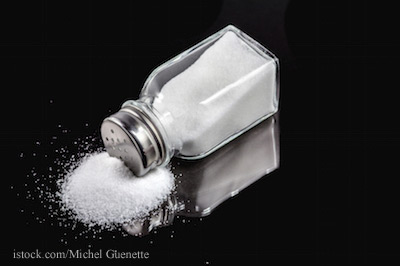New research published in the America Heart Association’s journal Circulation has found that in people who do not have high blood pressure (hypertension), a chronic high sodium diet is associated with the development of that disease.
 Researchers thought that a high sodium diet, over time, would cause damage to blood vessels in the endothelial layer. The study followed the sodium intake of 5,556 men and women in a city in the Netherlands as part of the PREVEND (Prevention of REnal and Vascular ENd stage Disease) study. They found that a diet sodium diet was associated with increases in two biomarkers that indicate endothelial dysfunction: serum uric acid (SUA) and urine albumin excretion (UAE).
Researchers thought that a high sodium diet, over time, would cause damage to blood vessels in the endothelial layer. The study followed the sodium intake of 5,556 men and women in a city in the Netherlands as part of the PREVEND (Prevention of REnal and Vascular ENd stage Disease) study. They found that a diet sodium diet was associated with increases in two biomarkers that indicate endothelial dysfunction: serum uric acid (SUA) and urine albumin excretion (UAE).
The endothelium in blood vessels is the thin layer of cells that line the interior surface. That layer is where circulating blood interacts with the heart and blood vessels. The cells filter fluid, act as a barrier between the heart and blood, and control the movement of materials and white blood cells between the bloodstream, blood vessels, and the heart. Endothelial dysfunction is a marker, or indicator, of heart disease.
The study states that “most individuals consume sodium far in excess of the recommendations from major health organizations. A high salt diet is believed to be responsible for 20 – 40% of all cases of hypertension in the United States, and approximately 6% of myocardial infarctions [heart attack] and strokes annually.”
Researchers refer to “sodium” instead of “salt” because societies that issue guidelines for sodium intake, such as the European Society of Hypertension, use that term. One gram of sodium is found in 2.5 grams of salt, or sodium chloride.
Hypertension was defined as blood pressure greater than 140/90. Only people who did not have high blood pressure were included in this study. The study results were adjusted for age, body mass index (BMI), sex, alcohol intake, smoking status, family history of high blood pressure, and urinary levels of potassium and calcium, among others.
Over 6.4 years, 878 of the studied patients developed hypertension. In general, a population will develop 38 cases of hypertension per 100,000 person-years. The incidence rate for the people who consumed the most sodium in this study was 99 cases of hypertension per 100,000 person-years. Those who consumed the least sodium in this study had an incidence rate of 28 cases of hypertension per 100,000 person-years.
Sodium intake was “significantly associated with incident hypertension.” The researchers conclude that “a high sodium diet may lead to biological changes favoring the development of hypertension if the high sodium diet is continued.”
In addition, the researchers believe that a chronic high sodium intake may “create a state of sodium sensitivity”, that may cause an “amplification loop”, which makes the condition worse.
So what should you take away from this study? Try to consume less sodium in your diet. Processed foods are the largest source of sodium in the American diet. Eat more whole foods, avoid processed foods, and don’t add much salt to your cooking.





This is a timely reminder that a diet high in salt is bad for your health. Especially important given the recent wave of – salt ISN’T bad for your reports in the news…